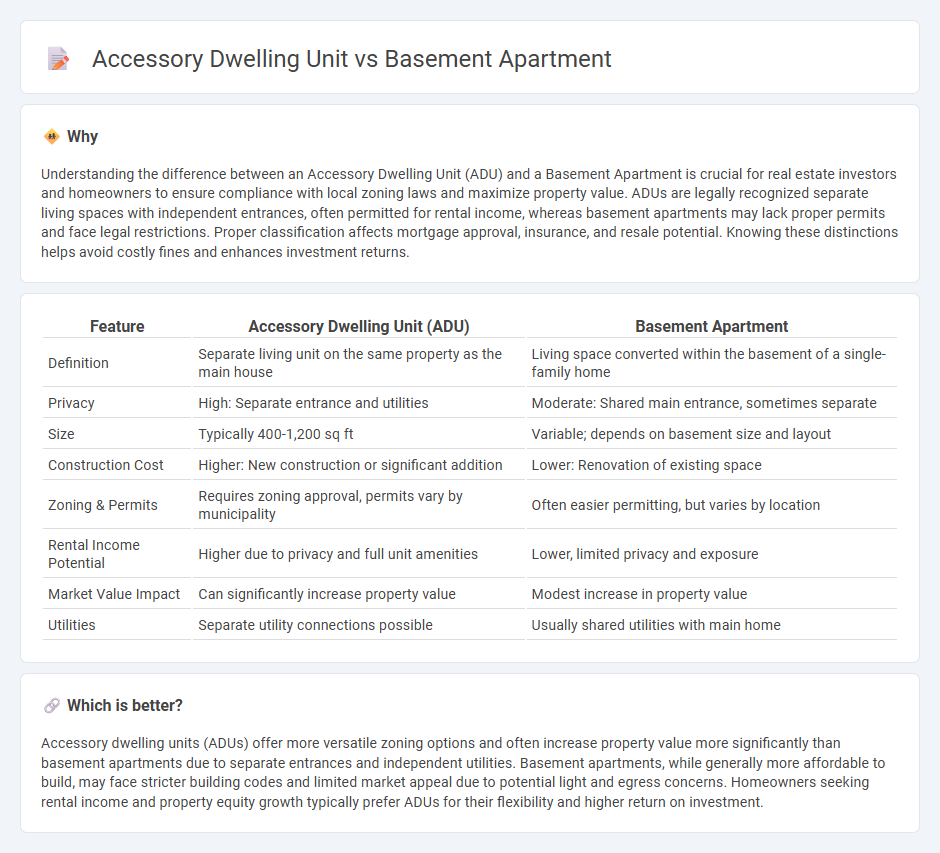
Accessory dwelling units (ADUs) and basement apartments offer distinct benefits in residential real estate, with ADUs being detached or semi-detached living spaces that provide homeowners flexibility and increased property value. Basement apartments utilize existing underground space, often costing less to create but sometimes facing challenges with natural light and egress requirements. Discover how these options can maximize your property's potential and compliance with local zoning laws.
Why it is important
Understanding the difference between an Accessory Dwelling Unit (ADU) and a Basement Apartment is crucial for real estate investors and homeowners to ensure compliance with local zoning laws and maximize property value. ADUs are legally recognized separate living spaces with independent entrances, often permitted for rental income, whereas basement apartments may lack proper permits and face legal restrictions. Proper classification affects mortgage approval, insurance, and resale potential. Knowing these distinctions helps avoid costly fines and enhances investment returns.
Comparison Table
| Feature | Accessory Dwelling Unit (ADU) | Basement Apartment |
|---|---|---|
| Definition | Separate living unit on the same property as the main house | Living space converted within the basement of a single-family home |
| Privacy | High: Separate entrance and utilities | Moderate: Shared main entrance, sometimes separate |
| Size | Typically 400-1,200 sq ft | Variable; depends on basement size and layout |
| Construction Cost | Higher: New construction or significant addition | Lower: Renovation of existing space |
| Zoning & Permits | Requires zoning approval, permits vary by municipality | Often easier permitting, but varies by location |
| Rental Income Potential | Higher due to privacy and full unit amenities | Lower, limited privacy and exposure |
| Market Value Impact | Can significantly increase property value | Modest increase in property value |
| Utilities | Separate utility connections possible | Usually shared utilities with main home |
Which is better?
Accessory dwelling units (ADUs) offer more versatile zoning options and often increase property value more significantly than basement apartments due to separate entrances and independent utilities. Basement apartments, while generally more affordable to build, may face stricter building codes and limited market appeal due to potential light and egress concerns. Homeowners seeking rental income and property equity growth typically prefer ADUs for their flexibility and higher return on investment.
Connection
Accessory dwelling units (ADUs) and basement apartments are connected as both provide additional living spaces on a single residential property, often increasing property value and offering rental income potential. ADUs can be standalone structures or converted interior spaces like basement apartments, which function as independent units with separate entrances, kitchens, and bathrooms. Local zoning laws and building codes regulate both ADUs and basement apartments to ensure safety and legality in real estate developments.
Key Terms
Zoning regulations
Zoning regulations for basement apartments and accessory dwelling units (ADUs) differ significantly, impacting their legality and design. Basement apartments often face stricter limitations related to minimum ceiling height, emergency egress, and occupancy permits, while ADUs typically require adherence to specific size, setback, and parking requirements under local zoning codes. Explore detailed zoning guidelines to ensure compliance and optimize property use efficiently.
Separate entrance
Basement apartments and accessory dwelling units (ADUs) both typically feature separate entrances to ensure privacy and independent access for occupants. A separate entrance in basement apartments often involves a ground-level door distinct from the main home's entry, while ADUs may have their own exterior doors that provide full separation from the primary residence. Discover more about the design considerations and legal requirements for separate entrances in basement apartments and ADUs.
Occupancy permit
Basement apartments and accessory dwelling units (ADUs) often require distinct occupancy permits that vary by local zoning laws and building codes; basement apartments may face stricter fire and egress regulations due to below-ground construction. ADUs typically have more standardized permitting processes since they are designed as independent living spaces, often with their own entrance and utilities. Understanding these differences is crucial for legal compliance and safety--learn more about specific permit requirements in your area.
Source and External Links
What is a Basement Apartment? - Boom - A basement apartment is a unit located below street level beneath a building, often more affordable, with pros such as privacy and lower cooling costs, but cons like security risks and flooding concerns.
Basement Apartment Living: The Ultimate Guide - Basement apartments are primarily below ground level, often offering reduced utility costs due to natural insulation, but have less natural light and potential flooding risks compared to garden apartments.
Basement Apartments for Rent in Royal Oak MI - 126 Rentals - Basement apartments for rent in Royal Oak, MI commonly feature private entrances and full kitchens, with modern updates countering typical stereotypes of damp, dark spaces.
 dowidth.com
dowidth.com